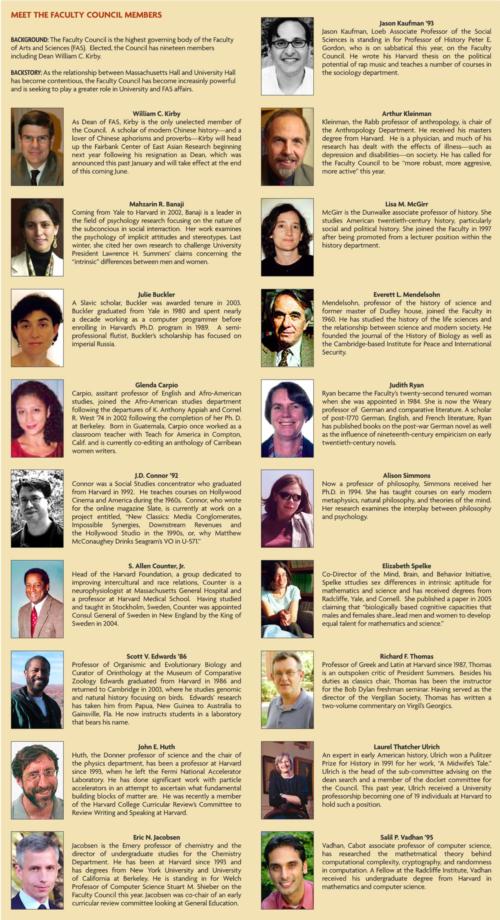
News
HMS Is Facing a Deficit. Under Trump, Some Fear It May Get Worse.

News
Cambridge Police Respond to Three Armed Robberies Over Holiday Weekend

News
What’s Next for Harvard’s Legacy of Slavery Initiative?

News
MassDOT Adds Unpopular Train Layover to Allston I-90 Project in Sudden Reversal

News
Denied Winter Campus Housing, International Students Scramble to Find Alternative Options
Council Calls for Halt in FAS Dean Search
Thomas: If Summers remains in office, search would be 'difficult in the extreme'

The highest governing body of the Faculty of Arts and Sciences (FAS)
called for a halt in the dean search process until professors can be
confident “that it would result in a dean who could enjoy the support
of both the President and the FAS.”
The Faculty Council’s 123-word statement yesterday suggests
that the president and professors are at a standstill over the
direction of the dean search. If this impasse is not resolved in the
next four-and-a-half months, the largest arm of the University could
enter the summer without a leader.
And the council offers no means for resolving this impasse—short of University President Lawrence H. Summers’ resignation.
Though the statement—which was e-mailed to professors last
night and released to The Crimson—never uses the word “resign,” several
council members have indicated that they want Summers to leave office.
Council member Richard F. Thomas, the chair of the Classics
Department, said that conducting a search while Summers remained
president would be “difficult in the extreme.”
And council member Laurel Thatcher Ulrich, a historian who is
the 300th Anniversary University professor, said that “there are
undoubtedly people on the Faculty Council who feel” that Summers should
step down.
The statement comes one week after the council, the 19-member
elected governing body of FAS, asked professors to consider a range of
options for the nascent dean search—including the possibility of
selecting a FAS chief independently of the central administration.
Faculty Dean William C. Kirby announced his resignation late
last month, after four individuals close to the central administration
told The Crimson that Summers was forcing Kirby out of office.
Since Kirby’s resignation, the council has sought to give the Faculty a stronger voice in Harvard’s governance.
“We tried to err on the side of representing the Faculty as
broadly as possible,” council member John Huth, the chair of the
Physics Department, said of yesterday’s statement. “We didn’t want to
prejudice things.”
WAITING GAME
Ulrich, who chaired yesterday’s council meeting in place of
Kirby, said that the Faculty is intent on pausing the dean search
process for the moment.
“We’re just taking the position, ‘not now,’” she said.
Council members, including Weary Professor of German and of
Comparative Literature Judith L. Ryan, said that conducting a dean
search in the current contentious climate of the University “would be
awkward and counterproductive.”
Ryan added that there will be “some greater clarity after Feb.
28”—the day that the full Faculty is set to vote on a motion of
no-confidence in Summers’ leadership.
At the Feb. 28 meeting, the Faculty will also consider a
motion urging the Harvard Corporation, the only body with the power to
fire Summers, to intervene in the dispute between the president and
professors.
“I would speak for myself that one of the audiences for this
besides the Faculty is the Corporation,” said council member Arthur
Kleinman, chair of the Anthropology Department.
“The Corporation hopefully is much more aware right now of
what the issues are than they have been in the past and are thinking
through what a suitable resolution would involve,” Kleinman said.
Council members stressed that they want a signficant voice in
Harvard’s governance—regardless of the outcome of the Feb. 28 votes,
and regardless of whether Summers remains in office.
“Implied [in yesterday’s statement] is that if an interim dean
is chosen or a new president or an interim president, we ought to be
involved,” said
council member Everett I. Mendelsohn, a professor of the history of science.
Summers’ spokesman, John D. Longbrake, declined to comment on the Faculty Council’s statement.
FACULTY FACES FUTURE
Council members expressed concern that University turmoil has
negatively affected their academic responsibilities. Huth said he
canceled a scheduled trip to India this week because “it seems like a
critical moment.”
Ulrich said the controversy has been a distraction. The
history professor said she has found herself thinking, “Where am I?
What century am I in?”
But the Council has been able to focus on the immediate future of the administration.
At the Feb. 7 meeting of the full Faculty, Ulrich presented a
proposal under which the Faculty would work closely with the president
in appointing a new dean.
That proposal called for the council to present Summers with a
list of possible dean search committee members. Summers would choose
members from that list, and the committee would then vet the finalists
for the deanship.
In response to Faculty discontent with Summers at the Feb. 7
meeting, the council later presented two more radical dean search
plans, including one option designed to exclude the President from the
process altogether.
“Frankly we were surprised and... [the meeting] gave us pause,” Huth said.
But after seeking input from individual professors,
departments, and the Caucus of Chairs—an independent and informal group
of department heads—the council embraced the original plan.
“Having considered the options, we believe that a plan
resembling the one put forth at the February 7 Meeting...would be the
most appropriate,” they said in yesterday’s statement.
But questions remain about when such a plan can be put into place—and under whose leadership.
Ulrich stressed that although the Faculty’s everyday work has been interrupted, it has not come to a full halt.
“Things are disrupted but not at a standstill,” Ulrich said. “We are not going to abandon ship.”
—Staff writer Allison A. Frost can be reached at afrost@fas.harvard.edu.
—Staff writer Samuel P. Jacobs can be reached at jacobs@fas.harvard.edu.
Want to keep up with breaking news? Subscribe to our email newsletter.
